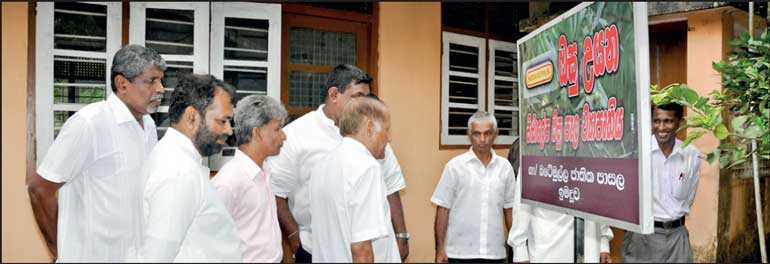Monday Feb 23, 2026
Monday Feb 23, 2026
Wednesday, 5 June 2019 00:00 - - {{hitsCtrl.values.hits}}


The Nelli trees are tall. The plants lush and bountiful. They are well tended, with organic manure and fresh water, by caring little hands daily. A large mesh made of natural substances cover a corner of the land for the wines to spread their leaves and branches of trees firmly rooted in the earth support the green stalks as they reach towards the sky. This is a typical herbal garden, in a school where Siddhalepa has undertaken herbal garden projects.
With their ambitious objective of planting a herbal garden in all schools in Sri Lanka, Siddhalepa’s Herbal Garden Project plays a huge supportive role in addressing this year’s theme and environmental concern – Air Pollution.
The project which began in 2010, has received the patronage of larger environment groups who have contributed and participated in this initiative which has now grown to proportions where it is a challenge to the Siddhalepa Group to accommodate the requests pouring in from schools to set up herbal gardens in their premises.
For, the setting up of a herbal garden is a process requiring the maximum effort and support of the Siddhalepa team. From the initial groundwork of identifying schools, preparing the land for plantation, distributing the plants, manure and tools, to monitoring the progress of the herbal garden to organising and conducting lectures from Ayurveda doctors of the importance and value of the herbs planted the schools garden, the involvement of the Siddhalepa teams headed by their area managers is vital. Without their participation and dedication, the project would not be launched and sustained for the past seven years.
The project is run by a committee comprising the principal of the school, its environment committee consisting of teachers and students, and the Siddhalepa sales team. Each of the country’s provinces has a dedicated sales team from Siddhalepa to start up and run the school’s herbal gardens.
While over 50,000 plants have so far been donated under this initiative, each school is supplied a minimum of 50-100 plants initially. Plants are selected according to the climate, soil of the area, etc. The most common plants among the Ayurveda plants are Nelli, Katupila, Ranawara, Komarika, Hathawariya, Beli and Ginger.
Distributing large quantities of Ayurveda herbs for the school gardens Siddhalepa has encouraged schools to plant Ayurveda herbs and educate the younger generation on their value in Ayurveda medicine. Our younger generation is not too familiar with Ayurveda herbs and their value and effectiveness in treating illnesses, MD Asoka Hettigoda said. “We take this opportunity to tell them about the value and importance of such indigenous herbs and the need to grow them in our own land in our talk to the school by an Ayurveda doctor or our sales area manages,” he added.
While there is a shortage of Ayurveda herbs in the country, compelling Siddhalepa Group to import from India, this grow green campaign in school gardens would replenish dwindling supplies and make school children familiar with these herbs while promoting green conservation.
The sales team provides the schools with plants, and equipment like mamoties, compost, baskets, gloves, etc. and also ensure the sustenance of the project, planning to expand its scale in the future.
Many schoolchildren’s enthusiasm about herbal gardens prompted them to persuaded their parents to plant Ayurveda herbs in their home garden as well, thus encouraging a higher than expected growth of Ayurveda plants in the rural areas where land was in abundance.
This course of events would be hugely advantageous to the domestic Ayurveda herb supply in future years.
By promoting the herbal gardens in school Siddhalepa is also encouraging entrepreneurial skills in the young to invest time and energy in planting herbs which can being them an income.
As a leading Ayurveda company, Siddhalepa has taken on the responsibility to educate the younger generation about the value of Ayurveda herbs in curing a number of illnesses and also in maintain a balanced health. The company invites Ayurveda doctors to talk to children about these aspects as part of the herbal garden project.
Consistently and courageously championing the green cause, the Siddhalepa has been among the country’s annual environment award winners in the past few years.
At the Presidential Environmental Awards 2016 the Hettigoda Industries was recognised for its commitment to the environment in the Industries category with an award.
The Hettigoda Group has a long history of recognition at Environment Awards. The Group has been among the winners at the National Cleaner Production Awards for water efficiency, material efficiency and production practices from 2009 to 2011 and won a Green Award for the second consecutive year.